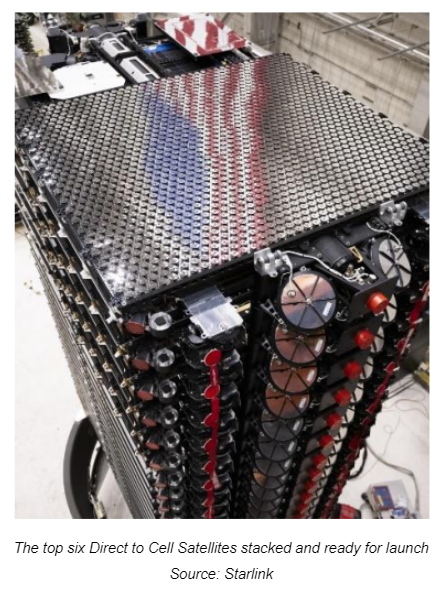SpaceX says it successfully sent text messages via Starlink satellites using T-Mobile’s network. Elon Musk’s company aims to bring its direct-to-device cell service to market in the coming year. This week’s test comes as major players pursue the market to connect unmodified cell phones to satellites so that customers have service even when they’re in a cell coverage dead zone, according to CNBC.
Inside Towers reported that SpaceX received FCC authorization to test the technology. Last week, it launched the first six Starlink satellites equipped with direct-to-device, or D2D, capabilities. Continue Reading
The company said it performed the texting demonstration on Monday — in which SpaceX “sent and received our first text messages to and from unmodified cell phones on the ground to our new satellites in space” — and declared the test “validates” that “the system works.”
SpaceX plans to begin offering D2D text service this year and expects to expand with voice, data and internet of things services in 2025. So far, the company has grown Starlink internet service to a network of more than 5,000 satellites in orbit, boasting more than 2.3 million customers worldwide.
The system requires larger, special versions of the Starlink satellites with D2D capability and uses 4G LTE protocols. Because the satellites move at tens of thousands of miles-per-hour relative to the Earth, data must be handed off seamlessly between them. Doppler shift, timing delays and the relatively low transmission power of smartphones must also be accounted for, notes Engadget.
The two companies aren’t the first to test such a system. Working with communications specialist AST SpaceMobile, AT&T said it successfully conducted the first two-way satellite audio call on its network in April, calling a number in Japan with a stock Samsung Galaxy S22 smartphone, according to Engadget.
Several smartphone makers, service providers and satellite companies have partnered on rolling out D2D service. Partnering with Globalstar, Apple is spending heavily to provide its “Emergency SOS with Satellite” service, which it rolled out with iPhone 14 models.
Qualcomm ended its partnership with satellite communications company Iridium late last year. Iridium on Wednesday announced a new project it calls “Project Stardust.” Iridium plans to test its D2D service in 2025 and begin rolling it out by 2026, reports CNBC.
By Leslie Stimson, Inside Towers Washington Bureau Chief





Reader Interactions